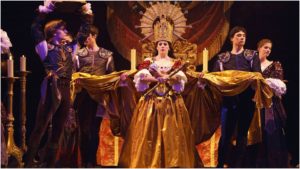
Opera Profile: Monteverdi’s ‘L’Incoronazione di Poppea’
By David SalazarThe first performance of Monteverdi’s “L’Incoronazione di Poppea” is largely unknown, though the only recorded date is from Dec. 26, 1842.
The opera, one of only three from Monteverdi that has survived in its complete form, is among the first to describe actual historical subjects instead of focusing just on mythological characters. The original manuscript does not survive the two copies from the 1650s that do showcase a number of major differences between them. Even today scholars cannot fully agree on whether all of the music is Monteverdi’s or other composers’ inclusions, but despite that, most would consider it his finest opera and his most regularly performed.
Short Plot Summary
The goddesses dispute over who has the most power over mankind, the God of Love ultimately convincing them to listen to the story of Nero and Poppea to see that he is the true victor.
Ottone goes looking for Poppea, but leaves upon realizing that Emperor Nerone’s men are guarding her villa. Nerone arrives to talk to his beloved Poppea. He departs and she is warned to be wary of his love and the threats that may come her way.
Ottavia, Nerone’s wife, bemoans her situation. Her nurse suggests she take a lover, but she refuses. Seneca, Nerone’s former tutor, tries to cheer up the Empress but is ridiculed by her page Valetto. Seneca receives warning from the goddess Pallade that his life is in danger. Nerone arrives and tells his tutor that he means to replace his wife with Poppea and Seneca questions the idea. Poppea tells Nerone that Seneca claims to be the power behind the throne, angering the Emperor to the point that he orders to force Seneca to commit suicide.
Meanwhile, Ottone begins plans to kill Poppea. He offers to marry Drusilla, a noblewoman who consoles him.
Seneca commits suicide while Nerone and the poet Lucano celebrate his death. Ottavia orders Ottone to kill Poppea, urging him to disguise himself as a woman to commit the deed. Ottone agrees and asks Drusilla to lend him her clothes.
Ottone attempts the deed but is stopped by the god of love. He flees though Arnalta, Poppea’s nurse, spots him in his escape, confusing him for Drusilla.
Drusilla is arrested. When questioned by the Emperor himself, she decides to protect Ottone and states that she is guilty. Nerone orders a painful death for her. Ottone rushes in to the rescue and confesses the full truth. Nerone spares both of their lives and Ottone and Drusilla run off into exile. Now feeling that he has reason to do so, Nerone exiles his wife.
Poppea is crowned Empress and the new rulers end the opera singing of their love.
Famous Musical Numbers
The final duet, “Pur ti miro” is the standout number from the work, its delicate and sensual beauty making it a perfect ending for this expansive work.
Watch and Listen
Check out this version that features Marc Minkowski, Anne Sophie von Otter, Mirelle Delunsch, Jean-Paul Fouchecourt, and Sylvie Brunet.
Categories
Opera Wiki

